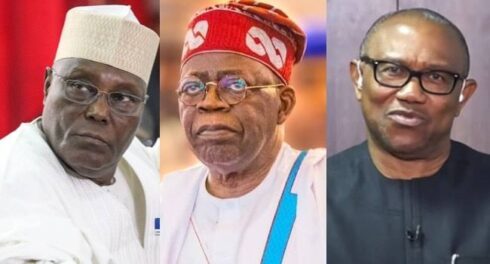The ruling All Progressives Congress (APC) has dismissed the possibility of an alliance between opposition leaders, former Vice President Atiku Abubakar and ex-Anambra Governor Peter Obi, successfully unseating President Bola Tinubu in the 2027 presidential election. This declaration was made by the APC National Publicity Director, Bala Ibrahim, during an exclusive interview with The opitanglobamedia on Tuesday.
APC’s Confidence in Tinubu’s Re-Election
Bala Ibrahim emphasized that the APC is not threatened by talks of a coalition between Atiku and Obi, describing it as a futile effort. According to Ibrahim, the APC remains unshaken by opposition attempts to replicate the coalition success of 2015 that led to Muhammadu Buhari’s victory over then-President Goodluck Jonathan.
“It is a dream gone wrong,” Ibrahim declared. “You don’t add up the total votes of opposition candidates in an election and expect to use that against a winner. A smart winner always exploits cracks within the opposition, and that’s exactly what the APC will continue to do.”
Ibrahim also highlighted APC’s preparedness for 2027, stating that their political machinery remains superior to that of the opposition. He further noted that the APC had established a Progressive Institute to train party members and opposition leaders in “progressivism.”
Opposition Leaders Hint at Collaboration
The possibility of an alliance between Atiku and Obi gained momentum following a statement by Atiku’s spokesperson, Paul Ibe, who noted that both leaders had learned lessons from the 2023 elections and were open to uniting against the APC.
Speaking on Channels Television’s Politics Today, Ibe said, “The combined votes of Atiku and Obi, which would have amounted to 12 million, could have stopped Tinubu’s presidency and the hardship he has inflicted on Nigerians.” Similarly, Obi’s media aide, Umar Ibrahim, expressed the Labour Party leader’s openness to collaboration but emphasized that any alliance must prioritize national interest over personal ambition.
However, critics within the opposition have pointed out challenges to this potential unity. The Deputy National Youth Leader of the People’s Democratic Party (PDP), Timothy Osadolor, described the alliance as “illusionary” due to ego clashes between the two leaders. Osadolor added, “If they go ahead and unite, they might provide a viable alternative to the APC, but their egos remain a significant obstacle.”
Coalition vs. Credibility
The debate over forming alliances in Nigerian politics has also extended to the Coalition of United Political Parties (CUPP) and the Social Democratic Party (SDP). While acknowledging the potential benefits of a coalition, CUPP National Secretary Peter Ahmeh stressed the need for credible elections as a prerequisite for any alliance to succeed.
“Our priority should be ensuring free and fair elections, with results determined at the polling units,” Ahmeh said. He cited Ghana as an example of a nation where electoral credibility starts and ends at the polling units, eliminating opportunities for result manipulation.
The SDP National Chairman, Shehu Gabam, however, argued that forming a coalition alone would not suffice to defeat the APC. “What Nigerians need is an assembly of credible individuals with proven track records, not just a coalition of political parties,” Gabam said. He added that trust deficits within opposition parties posed a significant challenge to any unified front.
APGA and Other Voices in the Opposition
The All Progressives Grand Alliance (APGA) has also weighed in on the matter, with its National Chairman, Sly Ezeokenwa, expressing readiness to collaborate with progressive forces across party lines. Ezeokenwa noted that with the resolution of APGA’s internal crises, the party is poised to play a more significant role in Nigeria’s political landscape.
“We believe in building a Nigeria that citizens can be proud of, and we are open to alliances that align with our vision,” Ezeokenwa stated. However, he echoed concerns about the complexities of merging different political interests.
Meanwhile, opposition voices have criticized the APC’s dismissal of the alliance as overconfident. Analysts argue that the growing dissatisfaction among Nigerians under APC’s leadership could galvanize a coalition capable of challenging Tinubu in 2027.
As the political landscape evolves, the debate over alliances and credible elections remains at the forefront of Nigeria’s road to 2027. Whether the opposition can overcome internal divisions and present a unified front will likely determine the outcome of the next presidential election.
.
Table of Contents
Discover more from OGM News NG
Subscribe to get the latest posts sent to your email.














